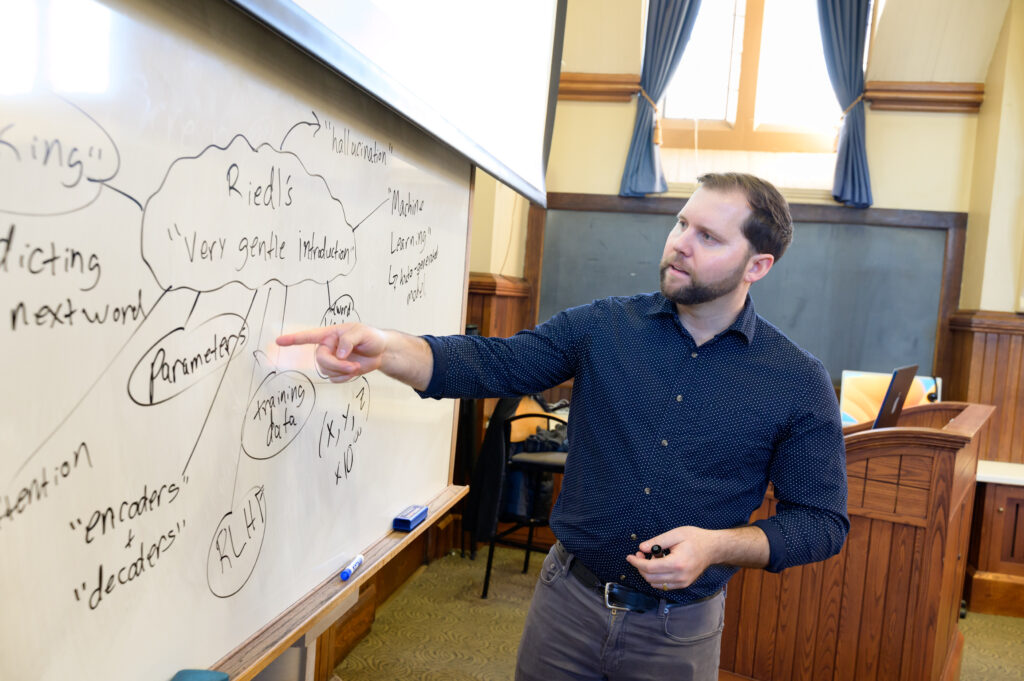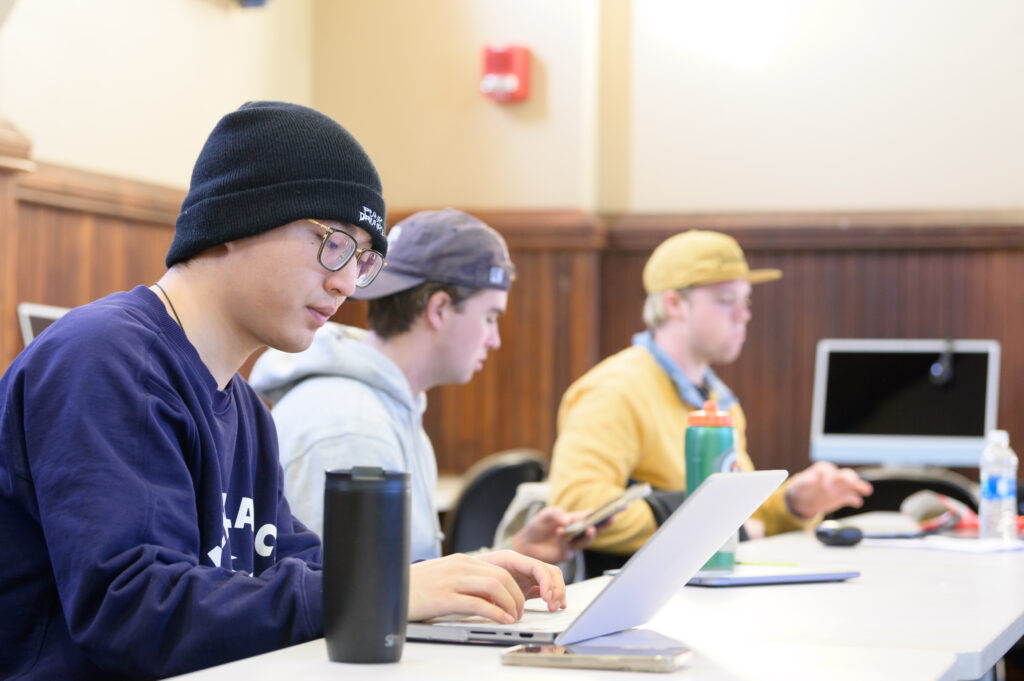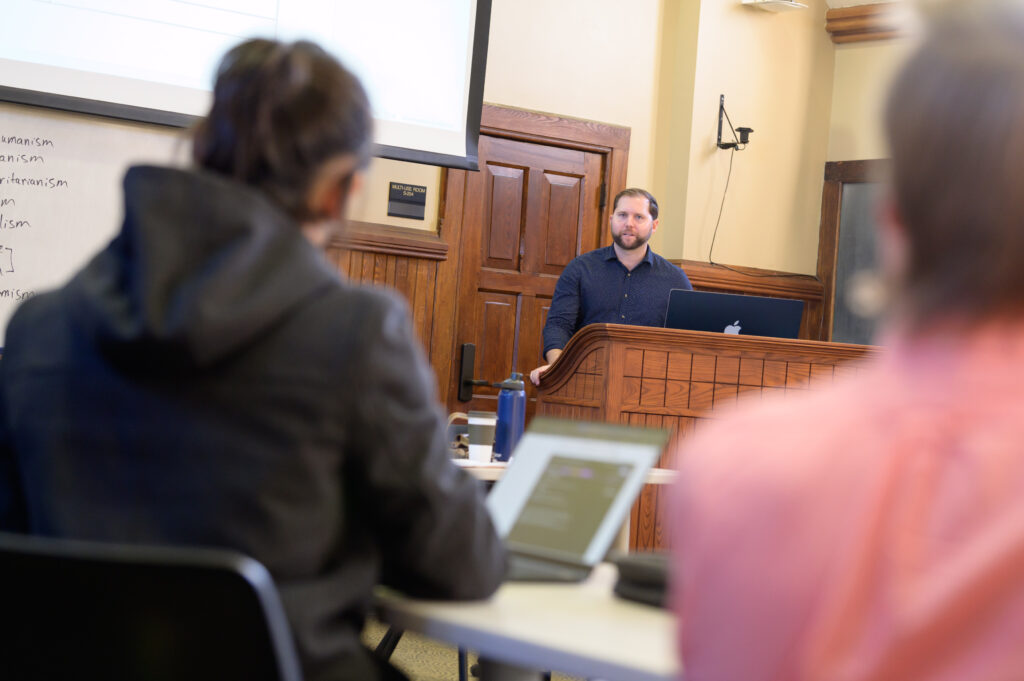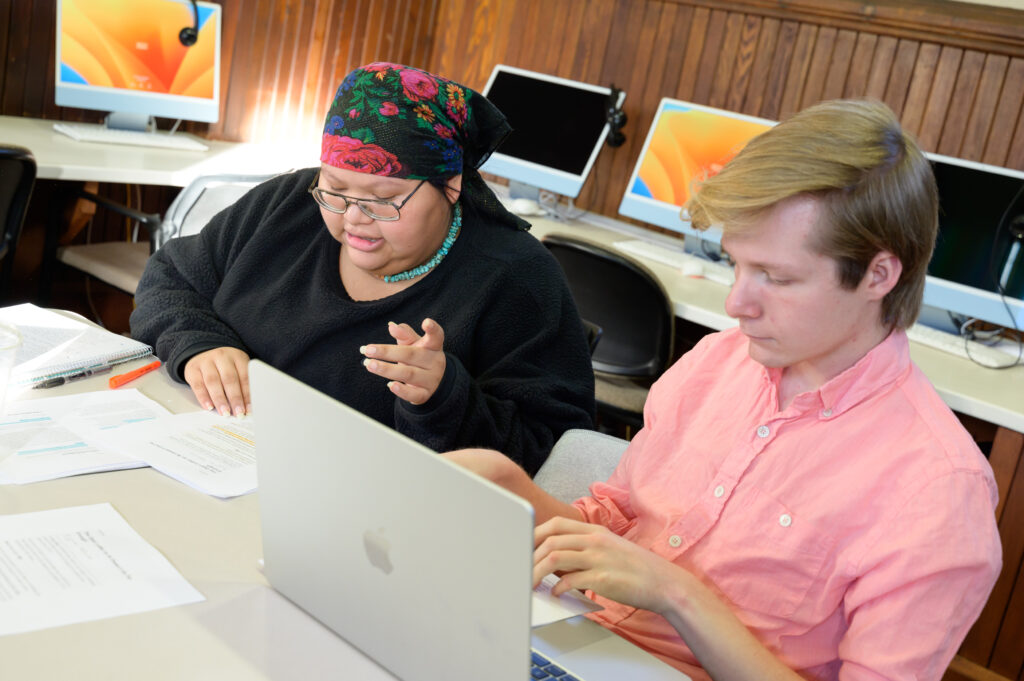Trinity Students Team Up with Artificial Intelligence in New J-Term Course
To explore just how intelligent the latest “artificial intelligence” chatbots really are, a Trinity College faculty member challenged students in a new January Term course to craft persuasive essays using only synthetically generated text.

This assignment was easier said than done—which is part of the lesson, according to Alex Helberg, visiting assistant professor in the Allan K. Smith Center for Writing and Rhetoric, who teaches “Writing and AI.”
“Large language models are essentially remix engines, just scraping and repackaging words they have seen elsewhere to try to sound like meaningful human writing,” Helberg said. “They don’t actually understand anything and can only produce variations of what humans have already produced.” Students needed to figure out what input to give the chatbots to get the desired output.
Before assigning students to create a “synthetic paper” during the intensive three-week J-Term course, Helberg first taught about the history of AI, all the way up to programs like OpenAI’s ChatGPT, Microsoft Copilot, Google’s Bard, which have been making headlines in recent years while debates rage about the technology’s use in educational and professional settings.
 These programs can generate text that speaks generally yet vaguely about many things, Helberg said, but may not work as well when it comes to original, hyper-local, or very specific topics. “The paper’s theme was to argue for a change to the Trinity curriculum or campus that would significantly improve the student experience, but every piece of information in the paper has to be verifiably accurate,” Helberg said. “The trick here is to strategically engineer input prompts so that your synthetic text technology is not generating misinformation.”
These programs can generate text that speaks generally yet vaguely about many things, Helberg said, but may not work as well when it comes to original, hyper-local, or very specific topics. “The paper’s theme was to argue for a change to the Trinity curriculum or campus that would significantly improve the student experience, but every piece of information in the paper has to be verifiably accurate,” Helberg said. “The trick here is to strategically engineer input prompts so that your synthetic text technology is not generating misinformation.”
The chatbot-written papers were accompanied by student-written journals containing the input prompts they provided and all generated output they used in the paper, plus reflection essays in which the students evaluated the process, what they learned, and whether they would use this technology in their own writing.
 Helberg developed this class following work he did with other faculty members and Trinity’s Center for Teaching and Learning on drafting syllabus policy statements about the use of AI in the classroom. “I wanted to look at the practice of how we integrate these technologies into our lives,” Helberg said. “The course is meant to be both philosophically provocative and also demystifying. We’re trying to prompt big thoughts about what AI means for humanity, while also cutting through the noise of what people are saying about it and trying to find a more realistic perspective of what AI can actually do.”
Helberg developed this class following work he did with other faculty members and Trinity’s Center for Teaching and Learning on drafting syllabus policy statements about the use of AI in the classroom. “I wanted to look at the practice of how we integrate these technologies into our lives,” Helberg said. “The course is meant to be both philosophically provocative and also demystifying. We’re trying to prompt big thoughts about what AI means for humanity, while also cutting through the noise of what people are saying about it and trying to find a more realistic perspective of what AI can actually do.”
Angelica Parra ’25, an anthropology and educational studies major from Queens, New York, said one of her favorite class exercises was about how to define intelligence. “We read about how we compare the human brain and memory to the way computers store and process data, but this analogy falls short and isn’t fully representative of the way our brains function,” she said. “I was surprised to learn that the synthetic text-generators are not as ‘intelligent’ as the media hyped them up to be.”
 The one-credit course, which met for three hours a day every day during J-Term, also examined the various ethical and policy issues involved with writing and AI, especially at educational institutions. “We looked at arguments people have made about what AI does and what it should and shouldn’t be used for, and assessed how we want AI to figure into our writing process, if we want it to at all. We covered a lot of ground in three weeks,” Helberg said.
The one-credit course, which met for three hours a day every day during J-Term, also examined the various ethical and policy issues involved with writing and AI, especially at educational institutions. “We looked at arguments people have made about what AI does and what it should and shouldn’t be used for, and assessed how we want AI to figure into our writing process, if we want it to at all. We covered a lot of ground in three weeks,” Helberg said.
While Helberg said that synthetic text generators don’t represent the death-knell of writing as a human-centered endeavor, he added that the technology can be a helpful tool in some stages of the writing process. “I believe that synthetic text-generating AI is most useful for brainstorming, as an engine for ideation. For example, it could suggest different ways to approach writing an argumentative paper about a particular topic or expose students to the diverse array of choices you have as a writer,” he said.
 Brian Martin ’25, of Brooklyn, New York, who is majoring in anthropology and minoring in rhetoric, writing, and media studies, said, “I was under the impression that large language models like ChatGPT were producing content nearly indistinguishable from that of human writers. It’s both refreshing and reassuring to learn that it’s fairly simple to recognize the work of synthetic text generators. This class has given me valuable, hands-on experience with some of these models and has made it clear how I can use these tools to enhance my writing while allowing me to retain my voice and perspectives.”
Brian Martin ’25, of Brooklyn, New York, who is majoring in anthropology and minoring in rhetoric, writing, and media studies, said, “I was under the impression that large language models like ChatGPT were producing content nearly indistinguishable from that of human writers. It’s both refreshing and reassuring to learn that it’s fairly simple to recognize the work of synthetic text generators. This class has given me valuable, hands-on experience with some of these models and has made it clear how I can use these tools to enhance my writing while allowing me to retain my voice and perspectives.”
Cam Sweedler ’24, a classical studies major and rhetoric, writing, and media studies minor from Westport, Connecticut, said “Contrary to some sensationalist views, we are not on the brink of a robot apocalypse. I believe all students and educators can benefit from AI, given that it is utilized as a tool rather than a solution.”
The 2024 J-Term allowed Trinity students to enroll in one course, for a maximum of one credit, during a three-week term from January 2 to 19, 2024. Students could choose from more than two dozen courses, taught either remotely or in person, including several offered at Trinity’s Rome campus.
